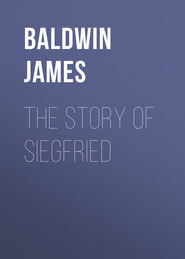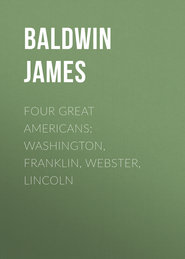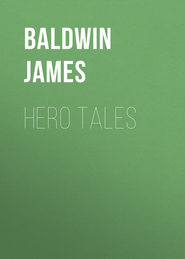По всем вопросам обращайтесь на: info@litportal.ru
(©) 2003-2024.
✖
Fifty Famous Stories Retold
Настройки чтения
Размер шрифта
Высота строк
Поля
The king turned about, and walked sadly away; and the miller went back to his work singing:—
"Oh, I'm as happy as happy can be,
For I live by the side of the River Dee!"
SIR PHILIP SIDNEY
A cruel battle was being fought. The ground was covered with dead and dying men. The air was hot and stifling. The sun shone down without pity on the wounded soldiers lying in the blood and dust.
One of these soldiers was a no-ble-man, whom everybody loved for his gen-tle-ness and kindness. Yet now he was no better off than the poorest man in the field. He had been wounded, and would die; and he was suf-fer-ing much with pain and thirst.
When the battle was over, his friends hurried to his aid. A soldier came running with a cup in his hand.
"Here, Sir Philip," he said, "I have brought you some clear, cool water from the brook. I will raise your head so that you can drink."
The cup was placed to Sir Philip's lips. How thank-ful-ly he looked at the man who had brought it! Then his eyes met those of a dying soldier who was lying on the ground close by. The wist-ful look in the poor man's face spoke plainer than words.
"Give the water to that man," said Sir Philip quickly; and then, pushing the cup toward him, he said, "Here, my comrade, take this. Thy need is greater than mine."
What a brave, noble man he was! The name of Sir Philip Sidney will never be for-got-ten; for it was the name of a Chris-tian gen-tle-man who always had the good of others in his mind. Was it any wonder that everybody wept when it was heard that he was dead?
It is said, that, on the day when he was carried to the grave, every eye in the land was filled with tears. Rich and poor, high and low, all felt that they had lost a friend; all mourned the death of the kindest, gentlest man that they had ever known.
THE UNGRATEFUL SOLDIER
Here is another story of the bat-tle-field, and it is much like the one which I have just told you.
Not quite a hundred years after the time of Sir Philip Sidney there was a war between the Swedes and the Danes. One day a great battle was fought, and the Swedes were beaten, and driven from the field. A soldier of the Danes who had been slightly wounded was sitting on the ground. He was about to take a drink from a flask. All at once he heard some one say,—
"O sir! give me a drink, for I am dying."
It was a wounded Swede who spoke. He was lying on the ground only a little way off. The Dane went to him at once. He knelt down by the side of his fallen foe, and pressed the flask to his lips.
"Drink," said he, "for thy need is greater than mine."
Hardly had he spoken these words, when the Swede raised himself on his elbow. He pulled a pistol from his pocket, and shot at the man who would have be-friend-ed him. The bullet grazed the Dane's shoulder, but did not do him much harm.
"Ah, you rascal!" he cried. "I was going to befriend you, and you repay me by trying to kill me. Now I will punish you. I would have given you all the water, but now you shall have only half." And with that he drank the half of it, and then gave the rest to the Swede.
When the King of the Danes heard about this, he sent for the soldier and had him tell the story just as it was.
"Why did you spare the life of the Swede after he had tried to kill you?" asked the king.
"Because, sir," said the soldier, "I could never kill a wounded enemy."
"Then you deserve to be a no-ble-man," said the king. And he re-ward-ed him by making him a knight, and giving him a noble title.
SIR HUMPHREY GILBERT
More than three hundred years ago there lived in England a brave man whose name was Sir Humphrey Gil-bert. At that time there were no white people in this country of ours. The land was covered with forests; and where there are now great cities and fine farms there were only trees and swamps among which roamed wild In-di-ans and wild beasts.
Sir Hum-phrey Gilbert was one of the first men who tried to make a set-tle-ment in A-mer-i-ca. Twice did he bring men and ships over the sea, and twice did he fail, and sail back for England. The second time, he was on a little ship called the "Squirrel." Another ship, called the "Golden Hind," was not far away. When they were three days from land, the wind failed, and the ships lay floating on the waves. Then at night the air grew very cold. A breeze sprang up from the east. Great white ice-bergs came drifting around them. In the morning the little ships were almost lost among the floating mountains of ice. The men on the "Hind" saw Sir Humphrey sitting on the deck of the "Squirrel" with an open book in his hand. He called to them and said,—
"Be brave, my friends! We are as near heaven on the sea as on the land."
Night came again. It was a stormy night, with mist and rain. All at once the men on the "Hind" saw the lights on board of the "Squirrel" go out. The little vessel, with brave Sir Humphrey and all his brave men, was swal-lowed up by the waves.
SIR WALTER RALEIGH
There once lived in England a brave and noble man whose name was Walter Ra-leigh. He was not only brave and noble, but he was also handsome and polite; and for that reason the queen made him a knight, and called him Sir Walter Ra-leigh.
I will tell you about it.
When Raleigh was a young man, he was one day walking along a street in London. At that time the streets were not paved, and there were no sidewalks. Raleigh was dressed in very fine style, and he wore a beau-ti-ful scar-let cloak thrown over his shoulders.
As he passed along, he found it hard work to keep from stepping in the mud, and soiling his hand-some new shoes. Soon he came to a puddle of muddy water which reached from one side of the street to the other. He could not step across. Perhaps he could jump over it.
As he was thinking what he should do, he happened to look up. Who was it coming down the street, on the other side of the puddle?
It was E-liz-a-beth, the Queen of England, with her train of gen-tle-wom-en and waiting maids. She saw the dirty puddle in the street. She saw the handsome young man with the scar-let cloak, stand-ing by the side of it. How was she to get across?
Young Raleigh, when he saw who was coming, forgot about himself. He thought only of helping the queen. There was only one thing that he could do, and no other man would have thought of that.
He took off his scarlet cloak, and spread it across the puddle. The queen could step on it now, as on a beautiful carpet.
She walked across. She was safely over the ugly puddle, and her feet had not touched the mud. She paused a moment, and thanked the young man.
As she walked onward with her train, she asked one of the gen-tle-wom-en, "Who is that brave gen-tle-man who helped us so handsomely?"
"His name is Walter Raleigh," said the gentle-woman.
"He shall have his reward," said the queen.
Not long after that, she sent for Raleigh to come to her pal-ace.
The young man went, but he had no scarlet cloak to wear. Then, while all the great men and fine ladies of England stood around, the queen made him a knight. And from that time he was known as Sir Walter Raleigh, the queen's favorite.
Sir Walter Raleigh and Sir Humphrey Gilbert about whom I have already told you, were half-broth-ers.
When Sir Humphrey made his first voy-age to America, Sir Walter was with him. After that, Sir Walter tried sev-er-al times to send men to this country to make a set-tle-ment.
But those whom he sent found only great forests, and wild beasts, and sav-age In-di-ans. Some of them went back to England; some of them died for want of food; and some of them were lost in the woods. At last Sir Walter gave up trying to get people to come to America.
But he found two things in this country which the people of England knew very little about. One was the po-ta-to, the other was to-bac-co.
If you should ever go to Ireland, you may be shown the place where Sir Walter planted the few po-ta-toes which he carried over from America. He told his friends how the Indians used them for food; and he proved that they would grow in the Old World as well as in the New.
Sir Walter had seen the Indians smoking the leaves of the to-bac-co plant. He thought that he would do the same, and he carried some of the leaves to England. Englishmen had never used tobacco before that time; and all who saw Sir Walter puff-ing away at a roll of leaves thought that it was a strange sight.
One day as he was sitting in his chair and smoking, his servant came into the room. The man saw the smoke curling over his master's head, and he thought that he was on fire.
"Oh, I'm as happy as happy can be,
For I live by the side of the River Dee!"
SIR PHILIP SIDNEY
A cruel battle was being fought. The ground was covered with dead and dying men. The air was hot and stifling. The sun shone down without pity on the wounded soldiers lying in the blood and dust.
One of these soldiers was a no-ble-man, whom everybody loved for his gen-tle-ness and kindness. Yet now he was no better off than the poorest man in the field. He had been wounded, and would die; and he was suf-fer-ing much with pain and thirst.
When the battle was over, his friends hurried to his aid. A soldier came running with a cup in his hand.
"Here, Sir Philip," he said, "I have brought you some clear, cool water from the brook. I will raise your head so that you can drink."
The cup was placed to Sir Philip's lips. How thank-ful-ly he looked at the man who had brought it! Then his eyes met those of a dying soldier who was lying on the ground close by. The wist-ful look in the poor man's face spoke plainer than words.
"Give the water to that man," said Sir Philip quickly; and then, pushing the cup toward him, he said, "Here, my comrade, take this. Thy need is greater than mine."
What a brave, noble man he was! The name of Sir Philip Sidney will never be for-got-ten; for it was the name of a Chris-tian gen-tle-man who always had the good of others in his mind. Was it any wonder that everybody wept when it was heard that he was dead?
It is said, that, on the day when he was carried to the grave, every eye in the land was filled with tears. Rich and poor, high and low, all felt that they had lost a friend; all mourned the death of the kindest, gentlest man that they had ever known.
THE UNGRATEFUL SOLDIER
Here is another story of the bat-tle-field, and it is much like the one which I have just told you.
Not quite a hundred years after the time of Sir Philip Sidney there was a war between the Swedes and the Danes. One day a great battle was fought, and the Swedes were beaten, and driven from the field. A soldier of the Danes who had been slightly wounded was sitting on the ground. He was about to take a drink from a flask. All at once he heard some one say,—
"O sir! give me a drink, for I am dying."
It was a wounded Swede who spoke. He was lying on the ground only a little way off. The Dane went to him at once. He knelt down by the side of his fallen foe, and pressed the flask to his lips.
"Drink," said he, "for thy need is greater than mine."
Hardly had he spoken these words, when the Swede raised himself on his elbow. He pulled a pistol from his pocket, and shot at the man who would have be-friend-ed him. The bullet grazed the Dane's shoulder, but did not do him much harm.
"Ah, you rascal!" he cried. "I was going to befriend you, and you repay me by trying to kill me. Now I will punish you. I would have given you all the water, but now you shall have only half." And with that he drank the half of it, and then gave the rest to the Swede.
When the King of the Danes heard about this, he sent for the soldier and had him tell the story just as it was.
"Why did you spare the life of the Swede after he had tried to kill you?" asked the king.
"Because, sir," said the soldier, "I could never kill a wounded enemy."
"Then you deserve to be a no-ble-man," said the king. And he re-ward-ed him by making him a knight, and giving him a noble title.
SIR HUMPHREY GILBERT
More than three hundred years ago there lived in England a brave man whose name was Sir Humphrey Gil-bert. At that time there were no white people in this country of ours. The land was covered with forests; and where there are now great cities and fine farms there were only trees and swamps among which roamed wild In-di-ans and wild beasts.
Sir Hum-phrey Gilbert was one of the first men who tried to make a set-tle-ment in A-mer-i-ca. Twice did he bring men and ships over the sea, and twice did he fail, and sail back for England. The second time, he was on a little ship called the "Squirrel." Another ship, called the "Golden Hind," was not far away. When they were three days from land, the wind failed, and the ships lay floating on the waves. Then at night the air grew very cold. A breeze sprang up from the east. Great white ice-bergs came drifting around them. In the morning the little ships were almost lost among the floating mountains of ice. The men on the "Hind" saw Sir Humphrey sitting on the deck of the "Squirrel" with an open book in his hand. He called to them and said,—
"Be brave, my friends! We are as near heaven on the sea as on the land."
Night came again. It was a stormy night, with mist and rain. All at once the men on the "Hind" saw the lights on board of the "Squirrel" go out. The little vessel, with brave Sir Humphrey and all his brave men, was swal-lowed up by the waves.
SIR WALTER RALEIGH
There once lived in England a brave and noble man whose name was Walter Ra-leigh. He was not only brave and noble, but he was also handsome and polite; and for that reason the queen made him a knight, and called him Sir Walter Ra-leigh.
I will tell you about it.
When Raleigh was a young man, he was one day walking along a street in London. At that time the streets were not paved, and there were no sidewalks. Raleigh was dressed in very fine style, and he wore a beau-ti-ful scar-let cloak thrown over his shoulders.
As he passed along, he found it hard work to keep from stepping in the mud, and soiling his hand-some new shoes. Soon he came to a puddle of muddy water which reached from one side of the street to the other. He could not step across. Perhaps he could jump over it.
As he was thinking what he should do, he happened to look up. Who was it coming down the street, on the other side of the puddle?
It was E-liz-a-beth, the Queen of England, with her train of gen-tle-wom-en and waiting maids. She saw the dirty puddle in the street. She saw the handsome young man with the scar-let cloak, stand-ing by the side of it. How was she to get across?
Young Raleigh, when he saw who was coming, forgot about himself. He thought only of helping the queen. There was only one thing that he could do, and no other man would have thought of that.
He took off his scarlet cloak, and spread it across the puddle. The queen could step on it now, as on a beautiful carpet.
She walked across. She was safely over the ugly puddle, and her feet had not touched the mud. She paused a moment, and thanked the young man.
As she walked onward with her train, she asked one of the gen-tle-wom-en, "Who is that brave gen-tle-man who helped us so handsomely?"
"His name is Walter Raleigh," said the gentle-woman.
"He shall have his reward," said the queen.
Not long after that, she sent for Raleigh to come to her pal-ace.
The young man went, but he had no scarlet cloak to wear. Then, while all the great men and fine ladies of England stood around, the queen made him a knight. And from that time he was known as Sir Walter Raleigh, the queen's favorite.
Sir Walter Raleigh and Sir Humphrey Gilbert about whom I have already told you, were half-broth-ers.
When Sir Humphrey made his first voy-age to America, Sir Walter was with him. After that, Sir Walter tried sev-er-al times to send men to this country to make a set-tle-ment.
But those whom he sent found only great forests, and wild beasts, and sav-age In-di-ans. Some of them went back to England; some of them died for want of food; and some of them were lost in the woods. At last Sir Walter gave up trying to get people to come to America.
But he found two things in this country which the people of England knew very little about. One was the po-ta-to, the other was to-bac-co.
If you should ever go to Ireland, you may be shown the place where Sir Walter planted the few po-ta-toes which he carried over from America. He told his friends how the Indians used them for food; and he proved that they would grow in the Old World as well as in the New.
Sir Walter had seen the Indians smoking the leaves of the to-bac-co plant. He thought that he would do the same, and he carried some of the leaves to England. Englishmen had never used tobacco before that time; and all who saw Sir Walter puff-ing away at a roll of leaves thought that it was a strange sight.
One day as he was sitting in his chair and smoking, his servant came into the room. The man saw the smoke curling over his master's head, and he thought that he was on fire.











